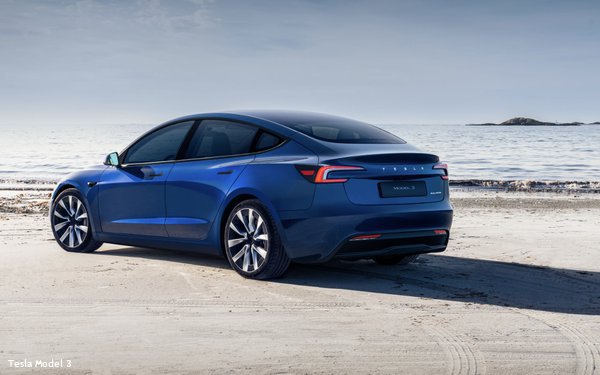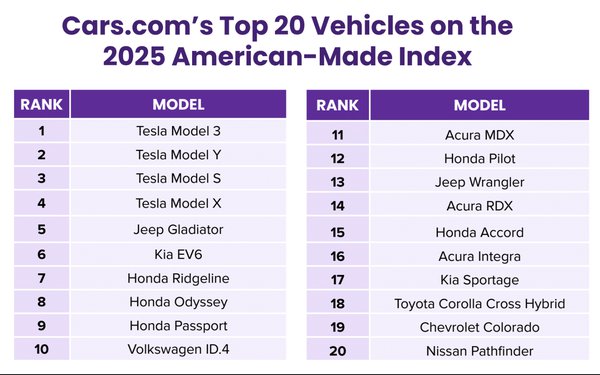
With tariffs threatening to drive
up prices, vehicle shoppers have become acutely aware of what is and isn’t “American.”
Texas-based Tesla claims the top four spots in car-shopping marketplace
Cars.com's 20th annual American-Made Index released today.
After holding the No. 1 position for three
consecutive years with the Model Y, Tesla now leads with the Model 3, followed by the Models Y, S and X. Rounding out the top five is the Jeep Gladiator, making it the highest-ranked American-made
pickup truck.
Cars.com experts independently evaluated more than 400 vehicles from the 2025 model year to identify the 99 that contribute most to the U.S. economy through
manufacturing, parts sourcing and employment. Of the 99 vehicles on the list, 67 were made by international manufacturers. General Motors had the most
vehicles of any automaker on the list, with 15. It was followed by Toyota (14), Ford (13) and Honda (13).
advertisement
advertisement
Automakers like Honda stand out for consistency and scale.
Its Alabama facility produces five of this year’s top 20 vehicles — including the Ridgeline, Odyssey, Passport, Pilot and Acura MDX. General Motors also remains a dominant player with the
most vehicles on this year’s index.
Kia’s West Point, Ga., plant builds both the EV6 and Sportage, while Volkswagen’s Chattanooga, Tenn., facility produces
the ID.4 — one of only two non-Tesla electric vehicles in the top 20.
About 25% of the more than 400 vehicles on sale in the U.S. made this year’s AMI, and whether
a vehicle is No. 1 or No. 99, it contributes to the U.S. economy, says Patrick Masterson, lead researcher for Cars.com’s American-Made Index.
Full domestic content is elusive.
The average domestic parts content of the top 10 vehicles was 83.4% in 2006; today, it’s 70.3%. While that figure has risen slightly in recent years, it still underscores how globally integrated
auto production has become.
“No vehicle has ever reached 100% domestic parts content in the index’s history,” Masterson says. “Manufacturing is a
complex, international process — and even our most American-made vehicles still depend on global supply chains.”
According to a recent Cars.com survey, more than half of
the respondents say they’ve accelerated their vehicle purchase timeline to avoid tariff-driven price hikes. According to a Cars.com survey of in-market shoppers, 51% say
tariffshave influenced them to seek out American-made vehicles; patriotism is a perk, but cost consciousness is the driving force.
About 73% of shoppers say
they’d consider an American-built vehicle to avoid added tariff costs. And some shoppers say they’d pay extra if that means supporting U.S. jobs, with 74% willing to pay up to 20%
more.
Cars.com’s American-Made Index ranks cars based on five factors: assembly location, parts sourcing as determined by the American Automobile Labeling Act, U.S. factory
employment relative to vehicle production, engine sourcing, and transmission sourcing.
